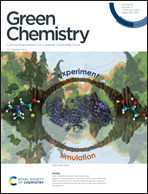Ultra-refining for the production of long-term highly pH-stable lignin nanoparticles in high yield with high uniformity
Abstract
In a bioeconomy, the valorization of lignin beyond its use to generate energy in renewable biomass-based industries is highly attractive and economically critical. However, most of its proposed applications are highly challenging and lignin remains a highly under-utilized renewable resource despite being extensively investigated. In this study, a disc ultra-refining process was used to produce lignin nanoparticles (LNPs). The resulting spherical LNPs were investigated using spectroscopic analysis (UV, FT-IR, and 1H NMR), which revealed that no significant changes occurred in the chemical structure when compared to unprocessed lignin with the exception that a greater number of chemical groups were exposed during the process. LNPs were produced in ∼100% yield with enhanced properties, including antibacterial activity, uniform particle size, and good UV absorption. They also showed very high pH stability (pH 2–14) over several months and formed a homogenous dispersion in a polymeric matrix. In addition, the proposed method also appears to be feedstock agnostic because it was efficient in producing LNPs from lignins obtained from cellulosic ethanol and the Kraft pulping process. This study demonstrates a single-step rapid mechanical method that required no chemical additives or heating, has low-energy consumption, and which makes use of a disc ultra-refining process, as an innovative green approach to produce pH-stable LNPs in high yield with high uniformity that are highly effective as a UV protector and antibacterial agent.



 Please wait while we load your content...
Please wait while we load your content...